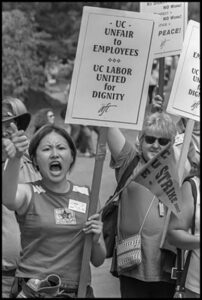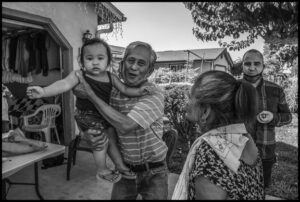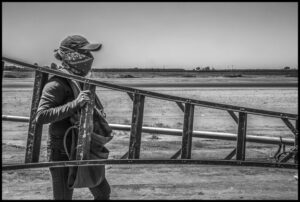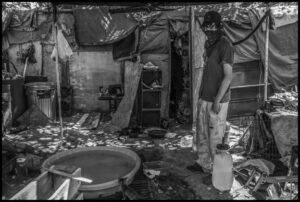By David Bacon
CFT United, 5/25/21
https://www.cft.org/article/job-security-still-table-uc-lecturers
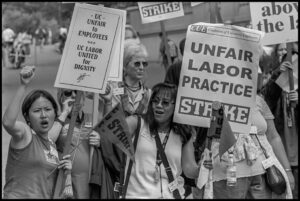
All photos © David Bacon, from strikes by lecturers, clericals, technical workers and others at the University of California Berkeley campus, 2002 and 2003.
When lecturers at the University of California fought in 1984 to win recognition for their union and the right to bargain, their biggest issue was job security. The university had a barbaric rule – lecturers were automatically terminated at the end of three to eight years of teaching, depending on the department. If, indeed, they lasted that long. At UC Santa Cruz, lecturer Roz Spofford proudly told her colleagues, “Our local was the first to fight the ‘four year’ rule. With AFT support, we were able to save the jobs of lecturers statewide.”
These contingent faculty members voted for the union by an overwhelming majority in one of the first elections held under the Higher Education Employer-Employee Relations Act. They then went into negotiations. It took two years to win agreement from the university on their first contract, and its signal achievement was ending the termination rule.
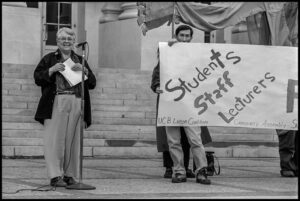
UC labor activist Margy Wilkinson, addressing rally of UC students, staff and lecturers.
Other contracts followed. After strikes on some campuses in 2002 and a three-year campaign, the union won continuing 3-year appointments for lecturers who complete six years of teaching and pass an exam, jokingly called by some “passing through the eye of the needle.” The university has to renew the appointments so long as classes are available the lecturer can teach.
Today, however, job security is still the most important issue for lecturers, especially for those still trying to reach the six-year goal. Only 7.8 percent of lecturers since 2003 have had continuing appointments. According to John Branstetter, president of the UC-AFT chapter at UCLA, it is difficult for lecturers to reach continuing status, because the closer they get to the six-year goal, the likelier it is they won’t be rehired.
The solution put forward by UC-AFT is a system to protect the job rights of lecturers as they continue teaching, especially their right to be rehired from one year to the next. But the unwillingness of the University of California administration to recognize job security as a key issue is preventing agreement on a new contract, although the old one expired over a year ago.
